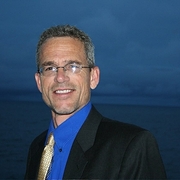Rick Yancey
Autore di The 5th Wave
Sull'Autore
Rick Yancey was born in Miami, Florida on November 4, 1962. He received a B.A. in English from Roosevelt University in Chicago. Before becoming a full time writer in 2004, he worked as a field officer for the Internal Revenue Service. His first book, A Burning in Homeland, was published in 2003. He mostra altro is the author of several series including The 5th Wave, The Extraordinary Adventures of Alfred Kropp, The Highly Effective Detective, and The Monstrumologist. He wrote a memoir entitled Confessions of a Tax Collector. In 2010, he received a Michael L. Printz Honor for The Monstrumologist. The 5th Wave was adapted into a movie. (Bowker Author Biography) mostra meno
Serie
Opere di Rick Yancey
The Monstrumologist Collection: The Monstrumologist; The Curse of the Wendigo; The Isle of Blood; The Final Descent (2014) 17 copie
The Monstrumologist 2 copie
De laatste ster 1 copia
Die 5. Welle (Die 5. Welle #1) 1 copia
Alpha Dog 1 copia
Opere correlate
Etichette
Informazioni generali
- Nome legale
- Yancey, Richard
- Data di nascita
- 20th century
- Sesso
- male
- Nazionalità
- USA
- Luogo di nascita
- Miami, Florida, USA
- Luogo di residenza
- Florida, USA
Chicago, Illinois, USA
Knoxville, Tennessee, USA
Gainesville, Florida, USA - Istruzione
- Roosevelt University
- Attività lavorative
- Internal Revenue Service tax collector
theater critic
playwright - Premi e riconoscimenti
- Michael L. Printz Honor
- Breve biografia
- Richard Yancey (born November 4, 1962)[citation needed] is an American author who writes works of suspense, fantasy, and science fiction aimed at young adults.
Rick Yancey was born in a Miami suburb, Florida.
Yancey wrote his first short story in seventh grade while attending Crystal Lake Junior High School in Florida. After graduating from Lakeland Senior High School, he was accepted to Florida Southern College and majored in Communications. After a year at Florida Southern College, Yancey transferred to Florida State University and ultimately graduated from Roosevelt University with a B.A. in English. After graduation, Yancey planned on attending law school.
Ultimately, Yancey decided against law school and began teaching English classes as well as acting and directing in local community theatres. In 1991, Yancey applied for a government job and was hired by the Internal Revenue Service, where he worked as an agent for twelve years.
Yancey also spent 10 years of his life in Knoxville, Tennessee, where two of his books are set.
While working at the IRS, Yancey wrote screenplays in his spare time. At the suggestion of his wife and collaborator, one of his screenplays became his first professionally published book, A Burning in Homeland (Simon and Schuster), published in 2001.
With the success of A Burning in Homeland, Yancey resigned from the IRS in 2004 to concentrate on writing full-time. His memoir, Confessions of a Tax Collector (HarperCollins, 2004), chronicles his days working at the IRS.
After the release of his memoir, Yancey began work on two series of books—one for adults, and one for children.
The Alfred Kropp series tells the story of an awkward teenager who saves the world when he comes into possession of King Arthur's famed sword, Excalibur—pursued by the secret cabal of knights who have hidden it for centuries. Published by Bloomsbury Children’s Publishing in the U.S. and the U.K., and in fifteen foreign language editions, the series comprised three books: The Extraordinary Adventures of Alfred Kropp (2005), The Seal of Solomon (2007), and The Thirteenth Skull (2008).
His Highly Effective Detective books (St. Martin’s Press) are whodunits for adult readers, featuring a charming but barely competent private investigator based in Tennessee. That series consists of four titles: The Highly Effective Detective (2006), The Highly Effective Detective Goes to the Dogs (2008), The Highly Effective Detective Plays the Fool (2010), and The Highly Effective Detective Crosses the Line (2011).
By 2010, Yancey had completed the first book in The Monstrumologist series. The tetralogy tells the tale of a 19th-century doctor and his young apprentice, who race around the world chasing—and being chased by—monsters. This highly acclaimed series, published by Simon and Schuster Children’s Books in the U.S. and the U.K, and in eight foreign language editions, comprised four books: The Monstrumologist (2009), The Curse of the Wendigo (2010), The Isle of Blood (2011), and The Final Descent (2013).
Utenti
Recensioni
Liste
Best Young Adult (2)
Best Dystopias (1)
Premi e riconoscimenti
Potrebbero anche piacerti
Autori correlati
Statistiche
- Opere
- 36
- Opere correlate
- 1
- Utenti
- 17,261
- Popolarità
- #1,285
- Voto
- 3.8
- Recensioni
- 841
- ISBN
- 315
- Lingue
- 17
- Preferito da
- 12



































































